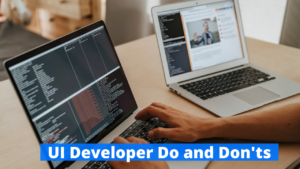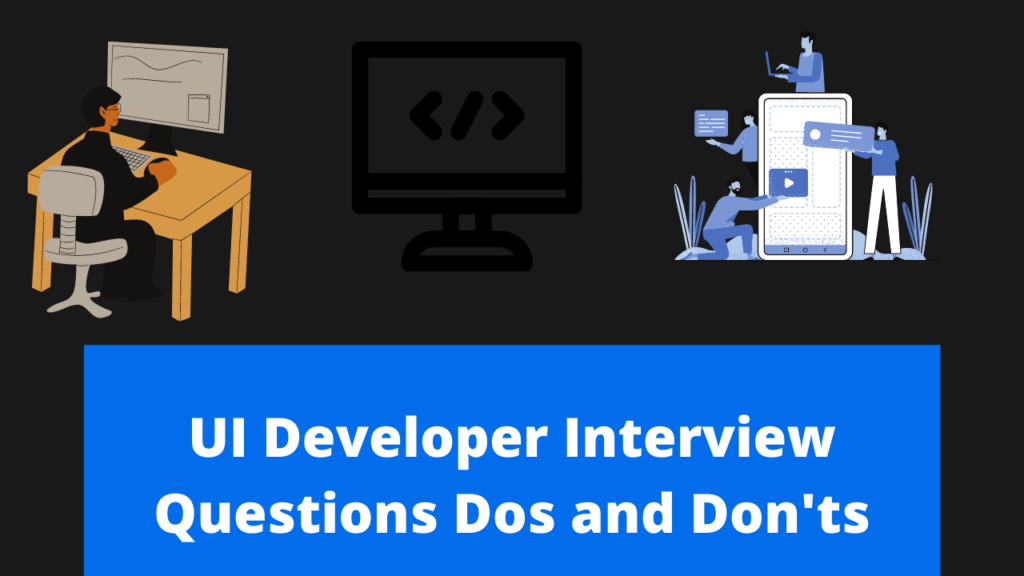UI Developer Interview Questions What to Do When You’ve Picked: If you’re invited to interview with a company, there’s a pretty good chance they want you. They might have even decided they want you before they reached out. However, just because they want you doesn’t mean that your interview will be an easy one. Job interviews can be stressful—especially if it’s your first time interviewing for a position. And there are certain questions that make many candidates nervous: Why are UI Developer interviews so nerve-wracking?
UI Developer Interview Questions -UI Developer Jobs
Top 5 Questions to Ask During a UI Developer Interview: The questions you ask during an interview should help illustrate your thought process. In many cases, an interviewer will see your knowledge, creativity, insight, and (sometimes) even your personality come through. To be on the safe side, don’t feel pressured to ask every question you can think of; it’s perfectly fine to pass on some questions if they don’t apply. However, that said… here are five questions you need to ask during a UI developer interview.
The Dos and Don’ts of UI Developer Interviews
If you’re looking to become a UI Developer, it’s time to think about the interview process and how to ace it, so that you can land the job of your dreams. A wise man once said, be at war with your vices, at peace with your neighbors, and let every new year find you a better man. I would add that one should be at war with their weaknesses and strive to improve them as well… in this case, I would also say be at war with your questions and let every new year find you an even better interviewer.

Do-1
Hit all your points. When you’re asked a question, give a thorough answer that hits on each bullet point. Explain your process from start to finish so there’s no confusion about how you approach something or what you expect. In other words, don’t leave out any details – it shows that you thought things through and offers them more insight into who you are as an employee.
Do-2
Adhere to basic professional dress standards. Leave personal jewelry at home, even simple wedding bands. Men should be clean-shaven. Women should have their hair in a neatly-styled ponytail or bun, not an elaborate updo or a hat. Do: Be on time for your interview. Follow up with a thank-you note when you arrive to show your appreciation for how well you were treated during your visit. Don’t: Shout across a large room to talk with coworkers—even if it seems efficient.
Do-3
Come prepared. You should have a solid idea about what to expect, so come with questions already researched—and some research done on your interviewers. For example, if you’re interviewing for a web developer job, it’s good to know who you’ll be meeting ahead of time; learning more about your potential employers will only increase your chances. Google them (or, at least check out their LinkedIn profiles), look up press mentions, find out what they like to tweet about—whatever helps get you better acquainted with your interviewers so that when it comes time for questions there’s no stumbling around trying to figure out who they are and what they do.
Read More:-Do You Know the Difference Between C and C++
Do-4
Show up to your interview 10-15 minutes early, if at all possible. Punctuality shows respect for your interviewer’s time. The hiring manager is likely juggling many different tasks, so showing up late means he or she will be stressed from you being late. It’s also better for you to wait in your car than enter a meeting room full of people who may not know who you are.
Do-5
While it’s good to be persistent, following up more than once a week after submitting your resume may end up looking desperate or unprofessional. If a company doesn’t respond within 10 days, it’s time to move on. Think about it from their perspective: if they were going to hire you, they probably would have by now. Instead, use that time to follow up with other companies and send them your resume. That way, you’ll ensure that you’re not wasting time—and can improve your chances of landing an interview with another potential employer.
Do-6
Prepare for your interview with mock interviews. This is an excellent way to build your confidence, practice your communication skills, and boost your success rate. Come up with questions that you want to ask in order to get a better idea of what it’s like on the other side. And try different types of mock interviews—both traditional (with another person) and alone (with just a piece of paper). Try out each type until you know which one works best for you.
Don’t send Resumes before you get an Interview
The majority of software developers are engineers, meaning they’re detail-oriented and not likely to take an interest in your resume until you’ve proven yourself. So, sending a resume before you know for sure that there’s interest is a waste of time—especially if your resume lands in a recruiter’s inbox. The exception here is if you have direct contact with someone on your target team. In those cases, it can be more appropriate to reach out before things get official with an I’m interested in doing X at Y company email. But even then, wait until you hear back from them before sharing resumes or going further down that path.
Don’t bother following up if it takes longer than 10 days after sending your resume
If you’re applying for a job, it’s perfectly acceptable to follow up by phone if you haven’t heard back from an employer within 10 days after sending your resume. At that point, they have time to go through their stack of resumes and start making calls themselves. If you try calling earlier than that, there’s really no excuse not to have read your resume—it makes them feel awkward. There are a few exceptions here: if you talk with someone on their team or if they say let me think about it, I will get back to you soon, then it’s ok to follow up after five days or so with a gentle reminder.
